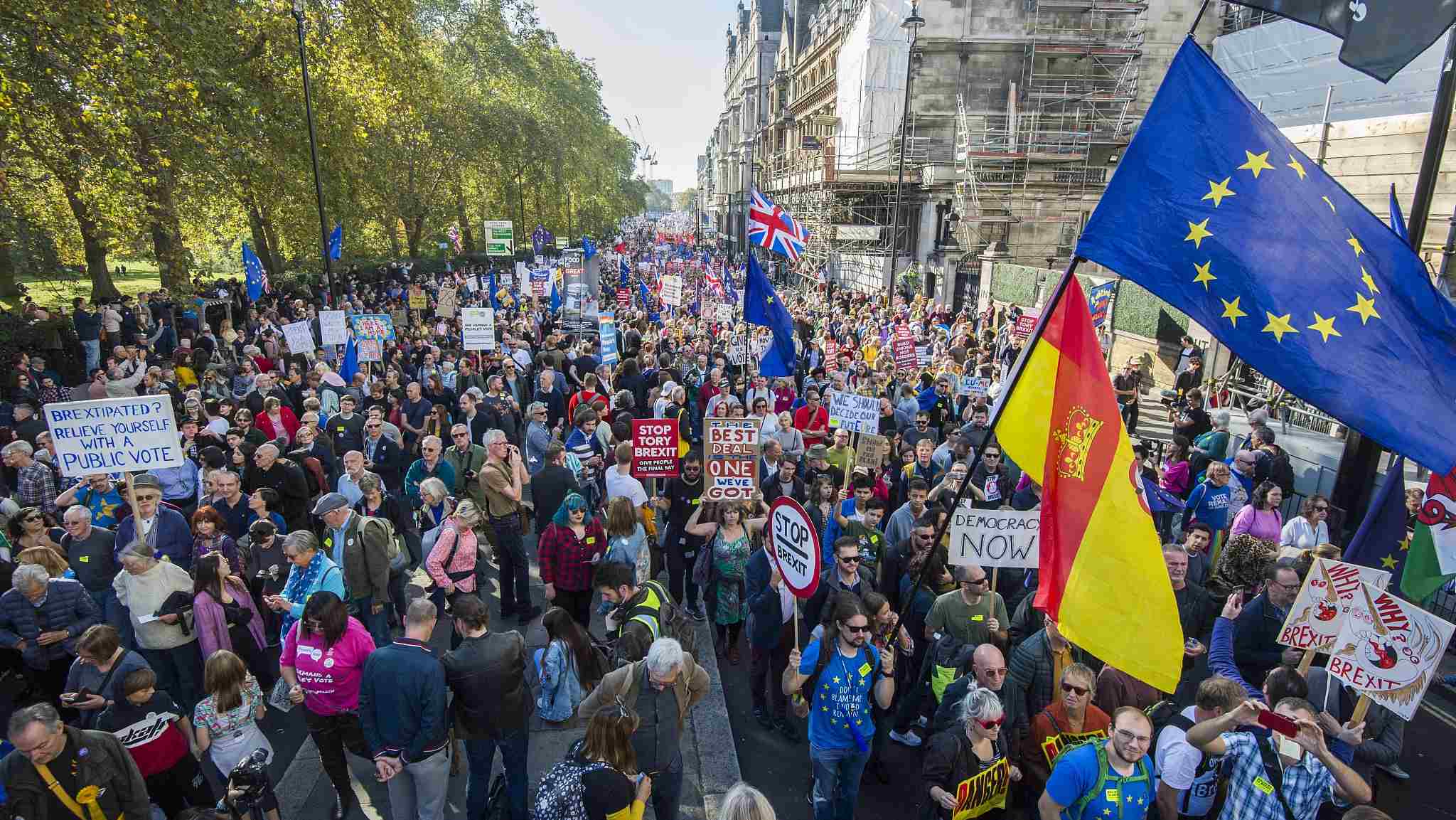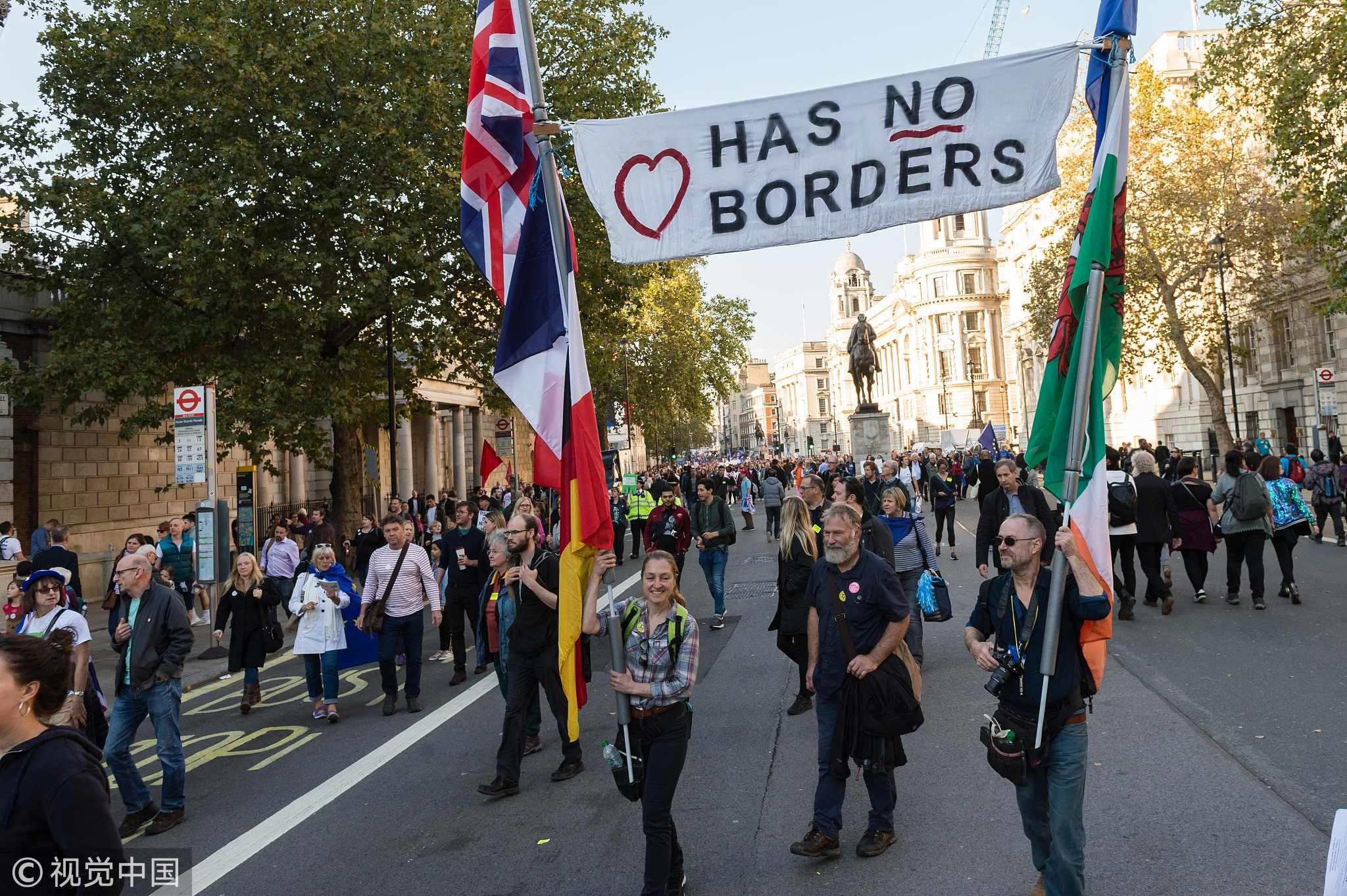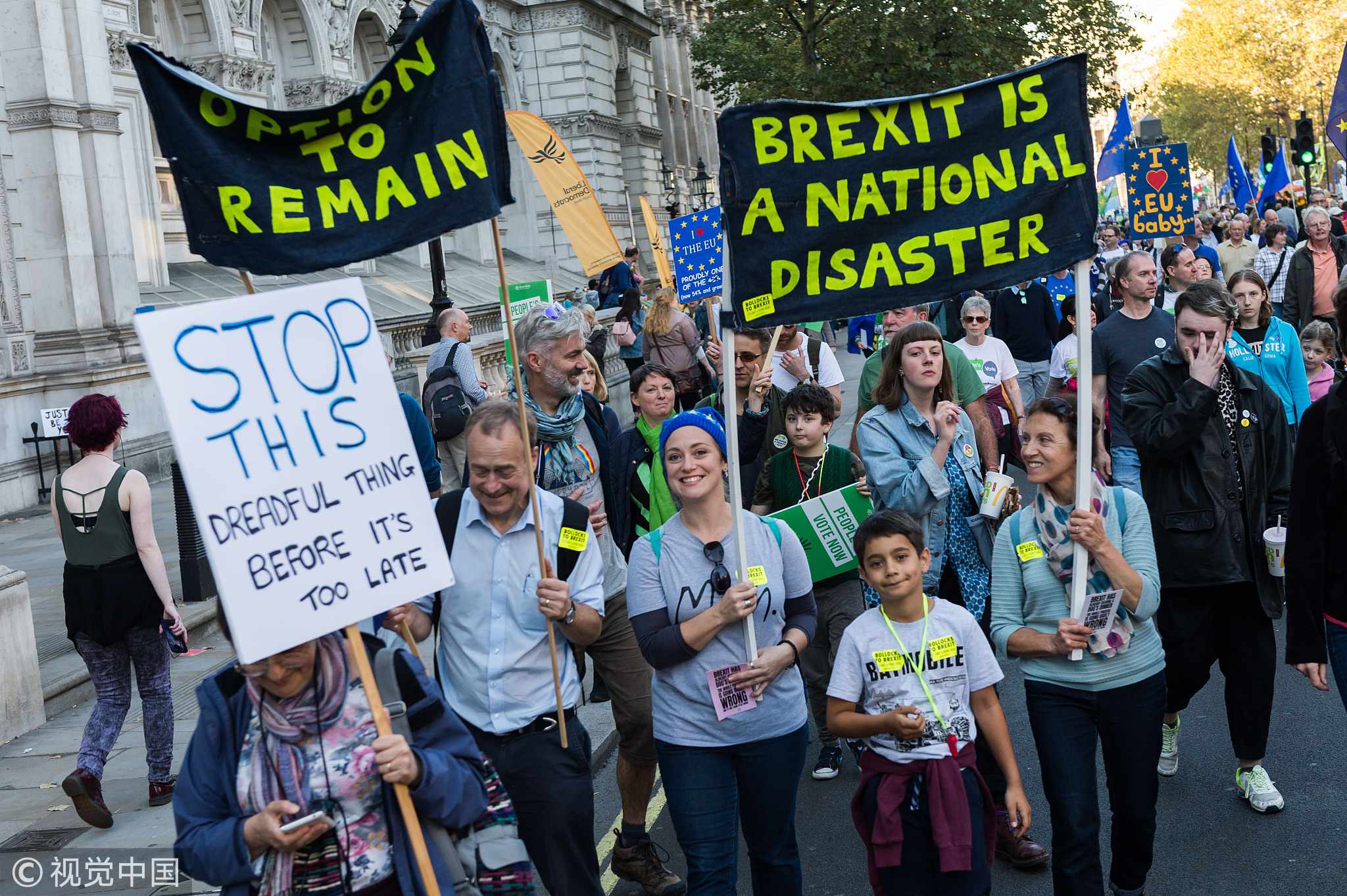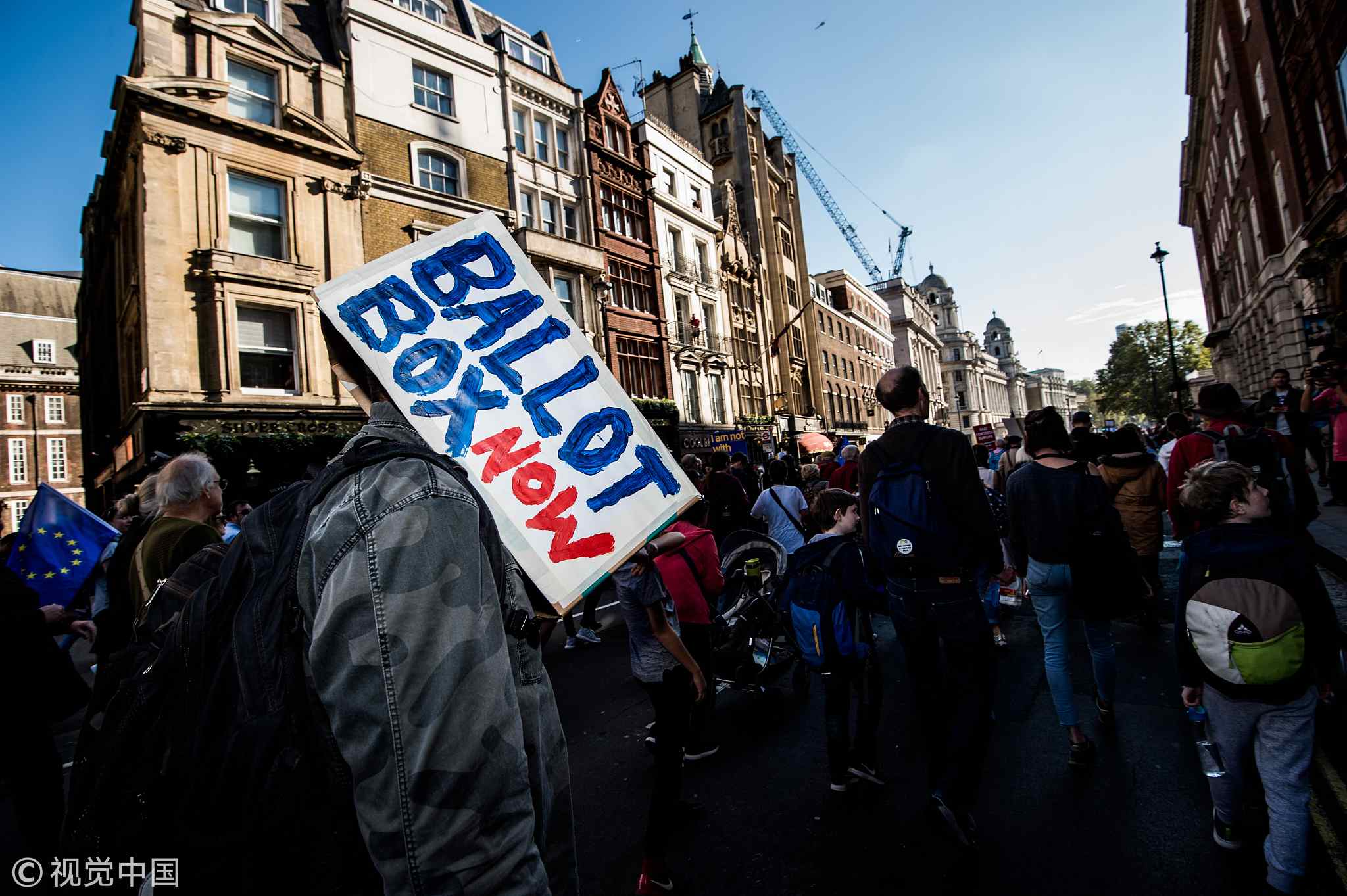
Opinions
12:39, 22-Oct-2018
Opinion: Is a 'People's Vote' on Brexit possible?
Updated
12:23, 25-Oct-2018
Tom Fowdy

Editor's Note: Tom Fowdy is a UK-based political analyst. The article reflects the author's views, and not necessarily those of CGTN.
The weekend saw approximately 700,000 people gather in London to march in favor of a “People's Vote,” or in other words a referendum, on the final Brexit deal secured between Theresa May's government and the European Union.
With many people lacking confidence that the prime minister will be able to reach a deal which fundamentally protects the UK's economic interests, the argument is that another vote on the final terms of Brexit would help ensure that such an outcome would be the one the majority of people in the country actually wanted.
As negotiations continue, the proposal has attracted support from a growing number of MPs (Member of Parliament) within Labour, the Liberal Democrats and the Scottish National Party. The sentiment is a manifestation of dissatisfaction over Brexit from the beginning.

Pro-EU supporters take part in the People's Vote march through central London to demand a final say on the Brexit deal in UK, on October 20, 2018. /VCG Photo
Pro-EU supporters take part in the People's Vote march through central London to demand a final say on the Brexit deal in UK, on October 20, 2018. /VCG Photo
However, despite the momentum the campaign may be receiving, the implementation of such a referendum remains unlikely, save that there is a total implosion of the political status quo in the immediate future.
Negotiations certainly aren't going well. Similarly, Theresa May's government seems jittery and divided, receiving pressure from its most Eurosceptic factions.
However, one thing glues the party together and prevents these people from actively toppling Theresa May, that is the fear of a collapse, a subsequent general election and the victory of a Jeremy Corbyn government which may opt to implement the “second referendum.”
This creates a reluctant commitment to the status quo. Even if many do not like it, struggling on with an underwhelming Brexit is a price worth paying to retain power, a second referendum is not even being given consideration.
There are a lot of threats, there have been calls for rebellion, resignations and political blackmail even, but only to communicate and posture political positions. Not Boris, nor David Davis, would be foolish enough to bring down the government in such tense circumstances.

Pro-EU supporters take part in the People's Vote march through central London to demand a final say on the Brexit deal in UK, on October 20, 2018. /VCG Photo
Pro-EU supporters take part in the People's Vote march through central London to demand a final say on the Brexit deal in UK, on October 20, 2018. /VCG Photo
The public reaction would be unsympathetic, angry and determined to get rid of the party. It would be political suicide. The government will certainly survive until the deal is reached and the exit date comes. This keeps out calls for a second vote.
Alternatively, people often hypothesize that Theresa May will not get her eventual deal through parliament and potentially bring about a feared “no deal” outcome by default. This is also unlikely. At most, there is only one Tory MP who would on principle risk their career to dare oppose such a three-line whip.
The other parties are likely to vote against it, but they will not have a majority. A small number of Labour MPs are also likely to back the deal against their own party's will, including Frank Field who recently resigned from the party, as well as Kate Hoey. Save that the government does not collapse, this vote is likely to be a formality at best.
Remain campaigners after all had hoped that Parliament would block Article 50, or other aspects of the negotiations that required legislative approval. This was the whole intent of Gina Miller's legal challenges, whom quickly became disappointed when her desired outcomes did not materialize.
Then, there is the question of a second referendum on what precisely? Here there is no agreement. When the Labour Party proposed the idea of another vote at their conference in September, Shadow Chancellor John McDonnell said it should only be on the terms of Brexit than an objection to remain in the EU.

Pro-EU supporters take part in the People's Vote march through central London to demand a final say on the Brexit deal in UK, on October 20, 2018. /VCG Photo
Pro-EU supporters take part in the People's Vote march through central London to demand a final say on the Brexit deal in UK, on October 20, 2018. /VCG Photo
Elements of his party were not happy with this. The whole campaign of the “People's Vote” seems to be blurred between the lines of a “referendum to reject Brexit” against a “referendum on the terms alone.”
What would the question be? In fact, it remains hypothetical as we do not know what the terms will be or how they will be received by the general public. There is of course uncertainty, but what happens if key issues happened to be resolved in the final deal and didn't meet the remainers' narratives? Would they be so keen for the vote then?
As a whole, a second referendum or “People's Vote” is unlikely. The actual chances of it happening lie at the end of long maze of political probabilities and other far-fetched outcomes. The passion for another referendum only goes to illustrate that Brexit is a highly contentious issue which has destabilized UK politics.
A lot of people are angry about it and determined to reverse the process at all costs. There are many indications that the final outcome is not going to be great, but it's already too late with less than half a year to the exit date. It's going to take a total disaster and a radical change to the parliamentary status quo to stop it.
(If you want to contribute and have specific expertise, contact us at opinions@cgtn.com.)

SITEMAP
Copyright © 2018 CGTN. Beijing ICP prepared NO.16065310-3
Copyright © 2018 CGTN. Beijing ICP prepared NO.16065310-3